Got a killer business idea in mind but aren't sure which online store builder to work with?
We feel your pain, as there are hundreds of ecommerce store builders out there, each specialising in different use cases.
The good news is, there's an online store builder out there for your business that's perfect for your requirements.
To help you find it, we've performed an in-depth analysis of the best online store builders available on the market so that you can take your business online and start selling online fast. But first, let's understand what online store builders are...
What are online store builders?
Online store builders are platforms that enable you to build your ecommerce website or app without having to code or have technical knowledge. They provide a user-friendly drag-and-drop interface with personalisation options so you can design your online store to fit your brand and requirements.
Online store builders are a gateway to getting your products online quickly, as they simplify the intricacies of online selling. The goal of online store builders is to enable you to set up your online presence as seamlessly as possible.
Advantages of online store builders
Apart from the obvious benefit of not having to code, there are many other advantages that ecommerce website builder brings to your project:
1 - Quick setup
When you build an online store from scratch, you might have to wait months before you can even see a working prototype, let alone the final app or website.
With their ready-made, customisable templates and drag-and-drop builder, online store builders can get your ecommerce business up and running in a matter of days.
2 - Cost-effective
Website and app development cost can be mind-bogglingly expensive if you use software development agencies that charge by the hour.
However, online store builders are much more cost-effective, as they provide a wide range of pre-built components. They also offer affordable monthly plans that also include hosting services and third-party integration costs.
3 - Integrations
No business today can work properly without a coherent tech stack. For instance, a retail business requires a POS system, inventory management, warehouse management, payment integrations and more.
Rather than building new capabilities, ecommerce website builders use APIs to integrate your online store with such third-party functionalities.
4 - Maintenance and aftercare
Building an online store is one thing, but running it is a different ball game altogether. You need to keep the store updated, fix bugs, improve security measures, add advanced features and much more.
While you may have to onboard separate maintenance services at an extra cost when you create an online store with a dev agency, some online store builders include it as part of your package.
This ensures your app runs smoothly without you breaking the bank.
8 best online store builders
Building an online store is a long-term investment and it's important for you to shop around to find the perfect platform for your ecommerce business.
As there's no one-size-fits-all solution, here are the top 8 platforms that you should consider. All information is correct as of September 2023.
Below the table, you'll see a full analysis of each platform and recommendations on who should use it 👇
Trustpilot rating (/5) | Pricing | Technical skills required | |
From $200/month (includes app + website) | No | ||
Shopify | $39-$2,000 (website only) | No | |
Squarespace | $16-$49/month (website only) | No | |
BigCommerce | $29-$299/month (website only) | No | |
WooCommerce | Free + Paid features (website only) | Yes | |
Wix | $16-$159/month (website only) | Yes | |
PrestaShop | Free + Paid features (website only) | Yes | |
Ecwid | Free-$82.50/month (website only) | Yes |
1 - Builder.ai: Best all-in-one online store builder
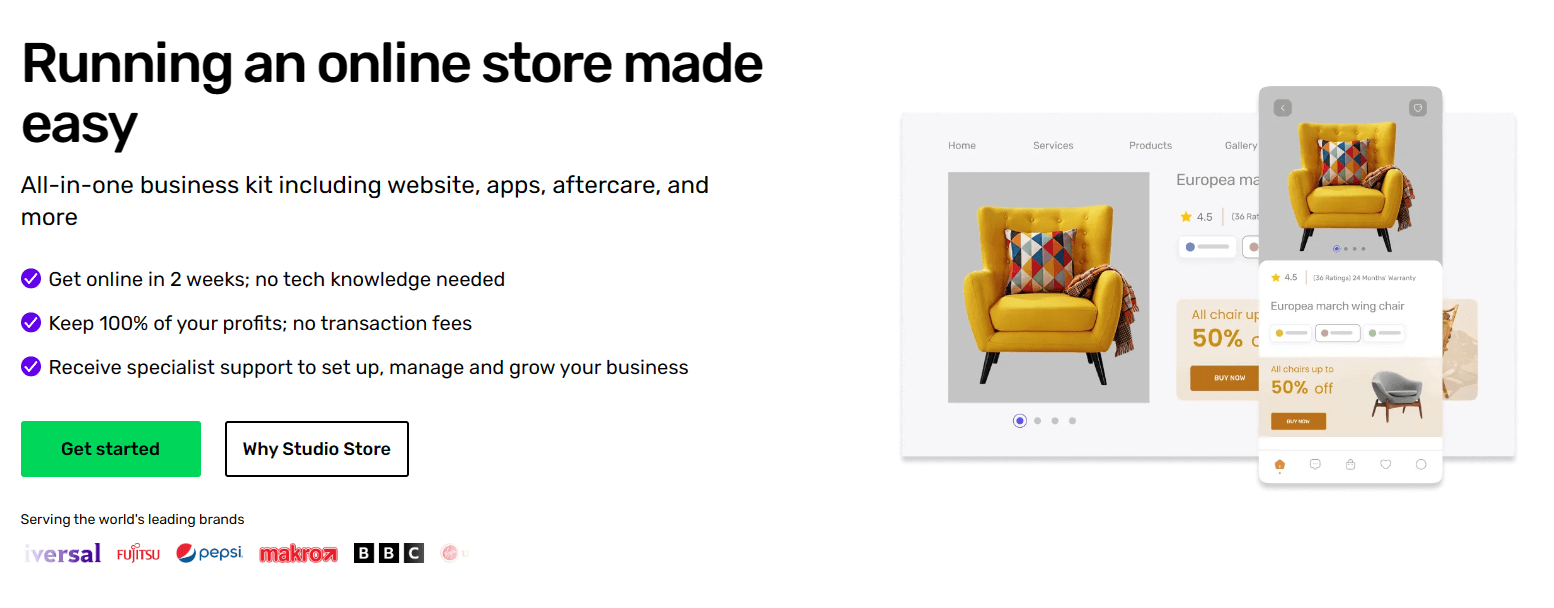
Builder.ai is one of the simplest and most reliable ways to take your business online. The platform's Studio Store offering allows you to build websites and apps with no coding involved.
All you need to do is share your app idea and Builder.ai provides you with a pre-packaged website and app to fit your needs, allowing you to start selling online in as little as two weeks.
You manage your online store from your own personalised dashboard, accessing sales data and customer insights to help you maximise your revenue.
You can also personalise your app and website with your branding, while seamlessly adding product inventory.
What’s more?
You Keep your code once your payment plan is complete, making it easy to add new features to meet emerging customer demands and scale your online store alongside your business. You can also can migrate your online store to another platform if you want, as it doesn’t have a vendor lock-in policy.
For building an online store through Studio Store, the pricing starts at $200. It doesn't matter how much revenue you generate or how many users visit your online store; once the price gets fixed, Builder.ai doesn't move the goalposts.
If you need any custom features from the outset or down the line, you can always use Builder.ai’s premium platform, Builder Studio.
Pros
- 4.3 Trustpilot rating
- Can build web, mobile and desktop apps
- No vendor lock-in
- Keep your code
- Guaranteed costs
- Limitless customisation
- One year of free aftercare
- 500+ advanced features
- Lego-like building blocks and human-assisted AI help to speed up the development process
Cons
- No free option
- Not for technical entrepreneurs
Our Verdict
Because Builder.ai’s Studio Store package includes both apps and websites, your online store can cater to both desktop and mobile users. This is crucial when selling online, given that 57% of shoppers prefer mobile apps to other channels.
Where Builder.ai really comes into its own, though, is the freedom it affords its customers. As you’re not locked in and you keep your code, you’re not tied to the platform, giving you the flexibility to change providers if needed.
Even if there’s no free option to test drive the platform, Studio Store is a great option for non-technical entrepreneurs hoping to establish and scale their businesses.
Want to start your app project with us?
Book a demoSpeak with one of our product experts today.
By proceeding you agree to Builder.ai’s privacy policy and terms and conditions

2 - Shopify: Best online store builder for performance

Shopify is a popular ecommerce website builder that powers thousands of websites and is known for its ease of use and built-in ecommerce tools.
The platform allows you to build online stores with fast loading speeds and offers more than 150 themes and customisable templates to choose from, though only a handful of them are free. Shopify also offers wide payment methods, third-party integrations, maintenance and 24/7 customer support.
Other than building you an online store, Shopify provides ecommerce tools like content creation tool, email marketing tool, analytics as well as sales and logistics which can come in handy while running your ecommerce business. However, you need to subscribe to some these tools and functionalities at an additional cost.
The biggest drawback of using Shopify is the amount of charges it levies on its customers. Shopify works on a recurring-fee model, where it charges a transaction fee of 2% for every sale you make and a payment gateway fee of 2-2.9% for using a third-party payment gateway unless you use Shopify Payments, their proprietary online payments system.
Other than that, there are other hidden costs like maintenance costs, hosting services, customisation costs and plugin costs. Moreover, if you want professional reporting, then you need to upgrade to more premium plans.
Another area that you must account for before locking on to Shopify is that the platform has a strict lock-in policy; in other words, you rent rather than own the code. This makes it challenging to migrate to another vendor if Shopify's services no longer meet your needs.
The platform's basic plan starts from $39/month; however, if you want to automate mundane manual tasks or want professional reporting, then you might have to pay up to $500/month.
Pros
- Ease of use
- Built-in ecommerce tools
- Wide payment integrations
- Fast loading speed
Cons
- 1.7 Trustpilot rating
- Limited free themes and features
- No ownership of code
- High transaction fee
- Very expensive to scale
Our verdict
Shopify can be a perfect platform for you if you've got deep pockets and sell high-margin physical products. The platform does offer good performance, aesthetics and support. You can also benefit from numerous ecommerce tools if you're willing to pay extra.
However, if you're an entrepreneur or a small business owner looking to start your online journey and keep costs down, then it's worth exploring other options from this list. After all, Shopify charges extra for functionalities like app usage charges, shipping label fees, transaction fees, email costs, and "tap to pay on iPhone".
3 - Squarespace: Best feature-rich online store builder

Squarespace is an ecommerce website builder best known for its stunning templates and easy-to-use drag-and-drop builder.
The range of ecommerce features Squarespace offers makes it an attractive option, including product variants, integrated payment gateways, inventory management, out-of-stock alerts and much more. The platform also provides in-built tools to create ad campaigns, generate advanced reporting, manage content and SEO, and more.
However, customisations are limited to the kind of template you choose. And you can only change colours, images and texts to align with your brand, as trying to add or move elements can be challenging.
While Squarespace also has a free personal plan, if you want to start an online store, then the platform offers three price plans for you. $23/month for Business, $27/month for Basic Commerce and $49 for Advanced Commerce. In the business plan, the platform charges a 3% transaction fee.
Also, if you need merchandising and advanced shipping, you must purchase the Advanced Commerce plan.
Pros
- Drag-and-drop builder
- Powerful built-in tools
- Payment gateway integrations
- No transaction cost for Commerce plans
Cons
- 1.5 Trustpilot rating
- The editing tool is not intuitive for true beginners
- Upgrade to a premium plan for advanced features
- Business plan includes a 3% transaction fee
Our verdict
With its drag-and-drop functionality and beautiful designs, Squarespace is a platform that works well for online stores trying to build strong visual identities. Plus, if you don’t mind paying a slightly higher subscription cost to avoid transaction fees, it can be a platform that deserves your attention.
However, if you want to manage large stocks and internationalise your payment methods, you could be at a disadvantage and may be better off exploring other options.
4 - BigCommerce: Best online store builder for multi-channel selling
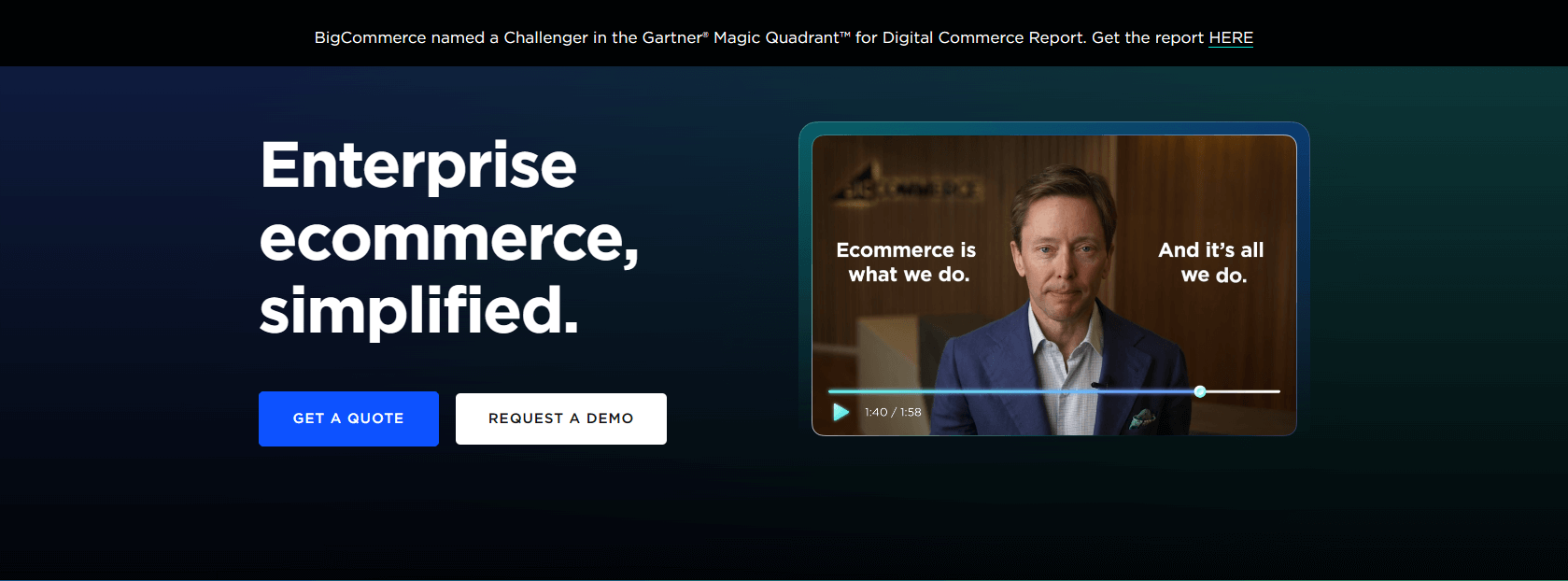
BigCommerce is a highly scalable platform that allows you to build an online store without you having to code or have technical knowledge. The platform has a drag-and-drop builder for you to create and customise your online store quickly.
The platform also has an app store where you can add extra features like marketing, online payment gateways, logistics services, accounting and more to your online store. And like Builder.ai, BigCommerce doesn't charge transaction fees.
BigCommerce is a platform where you can scale your online store as it offers multichannel sales capabilities. However, because of all its extensive features, BigCommerce becomes a wee bit complex and can be a challenging ecommerce platform for beginners.
Although BigCommerce doesn't charge transaction costs, its price plans are decided by the amount of revenue your online store generates. A $29/month Standard price plan is limited to $50k yearly sales. The $79/month Plus plan is limited to $180k yearly sales. And the $299/month Pro plan for businesses with $400k yearly sales.
Pros
- Drag-and-drop builder
- Highly scalable
- No transaction fees
- Integrated payment gateways
- Great marketing and SEO tools
Cons
- 1.5 Trustpilot rating
- Expensive themes
- Plans limited by sales cap
- Basic features like price listing, product filtering, customer reviews and more, come in expensive plans
Our verdict
BigCommerce can be a great option if you're a growing ecommerce business that wants to scale its processes and can afford expensive plans. The platform is ideal if you want to leverage multichannel sales and social media selling.
However, if you're a small business owner, you might have to shell out big bucks even for basic functionalities like syncing your tech stack through APIs.
5 - WooCommerce Checkout: Best online store builder for WordPress fans
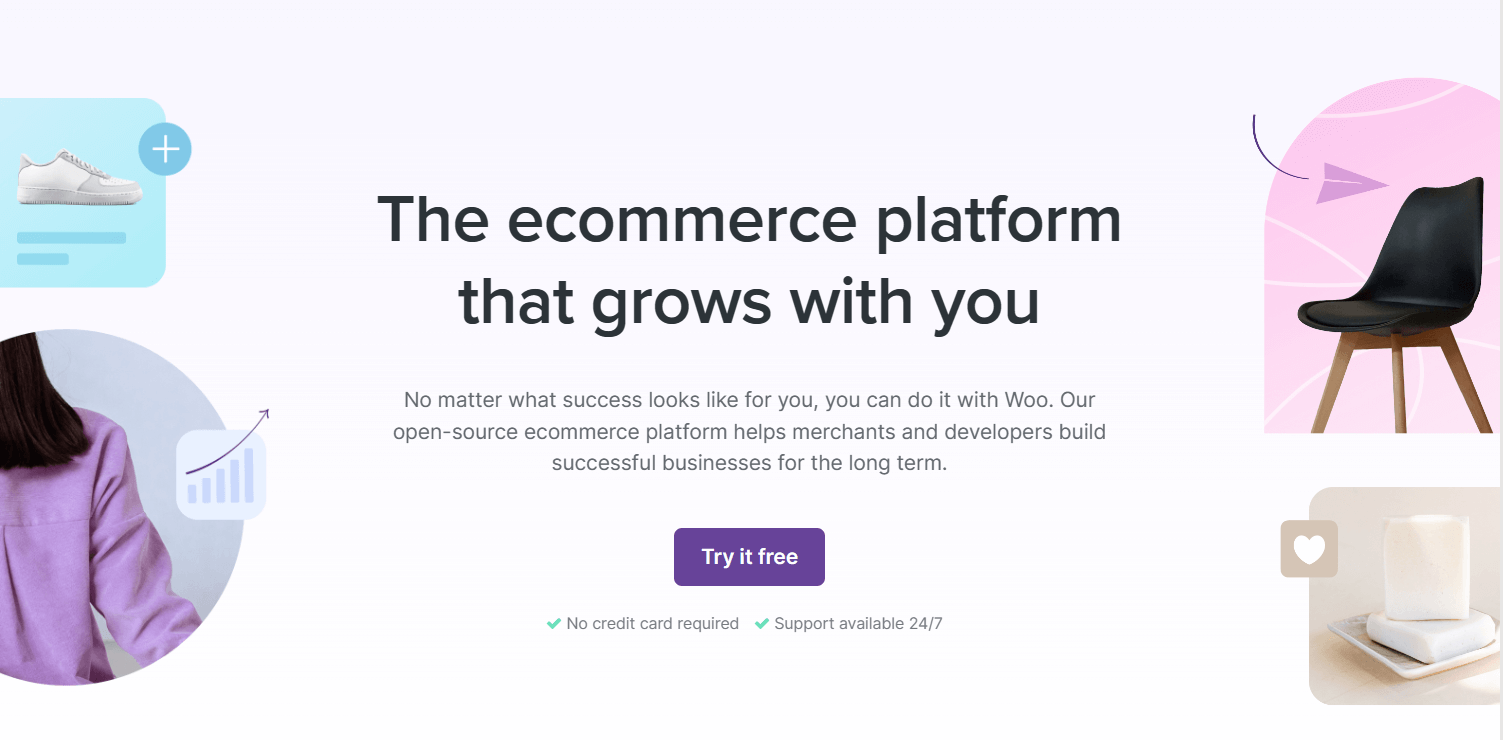
WooCommerce is a hugely popular open-source ecommerce plugin for WordPress. According to Statista, WooCommerce is the no.1 leading ecommerce software platform accounting for 38.74% of the market share.
So, if you're already running a WordPress website, WooCommerce Checkout can be a great platform to convert it into a basic online store. The plugin seamlessly integrates with WordPress and allows you to leverage its powerful content management system while managing your ecommerce operations.
You can customise your online store the way you want, but don't expect a helping hand here. To properly leverage WooCommerce you need solid technical knowledge. Also, while the plugin itself may be free, you have to pay for your custom domain name, a hosting plan, an SSL certification and integrations.
Pros
- The standard platform is free and open-source
- Integration with WordPress
- Huge collection of free and premium plugins and design options
- More access to payment options
Cons
- 2.2 Trustpilot rating
- Need a WordPress website to start as WooCommerce is just a plugin
- Premium plugins are costly
- Large learning curve
- Need paid WordPress hosting
Our verdict
WooCommerce checkout is a free WordPress plugin that allows you to add as many plugins as you need, making it highly flexible. It gives you more control over the design and functionality of your online store. It also supports various payment gateways and shipping methods, making it suitable for businesses of all sizes.
However, this platform is not for entrepreneurs and small online businesses that don’t have the technical knowledge and don’t want to spend on dedicated personnel just to maintain their online store. If you've got an affinity for WordPress and can handle all the technicalities independently, then WooCommerce should be your choice.
6 - Wix Stores: Best online store builder for casual sellers

Wix started out as a content website builder but later added ecommerce features to become an ecommerce website builder. On Wix Stores, you can create a content-rich website that handles basic ecommerce functionalities.
Wix Stores is a great choice for beginners as it helps them turn their hobbies into an online business. The platform provides you with hundreds of templates to choose from, where you can drag and drop features and move elements wherever you want on your online store.
Wix Stores provides all the essential features that an online store should've, like a shopping cart, secure payment options, search and filter options and more. But if you want a serious online store that has fast loading times and handles complex functionalities, then Wix might not be a great fit for your requirements.
The platform's price plans start from $1/month and go up to $159/month.
Pros
- 3.4 Trustpilot rating
- Easy to use
- 500+ templates to choose from
- Drag-and-drop functionalities
- Built-in SEO tools
Cons
- Limited ecommerce capabilities
- Limited payment gateways and integrations
- Slow loading time for content-heavy pages
- No visitor analytics in the Lite plan
Our verdict
If you’re a casual seller who wants flexibility in design and to go live in minutes, then Wix could be an excellent option for you.
But if you think you might need more advanced ecommerce features like inventory management and logistics management as your online business grows, you should consider more scalable and customisable platforms.
7 - PrestaShop: Best online store builder for tight budgets
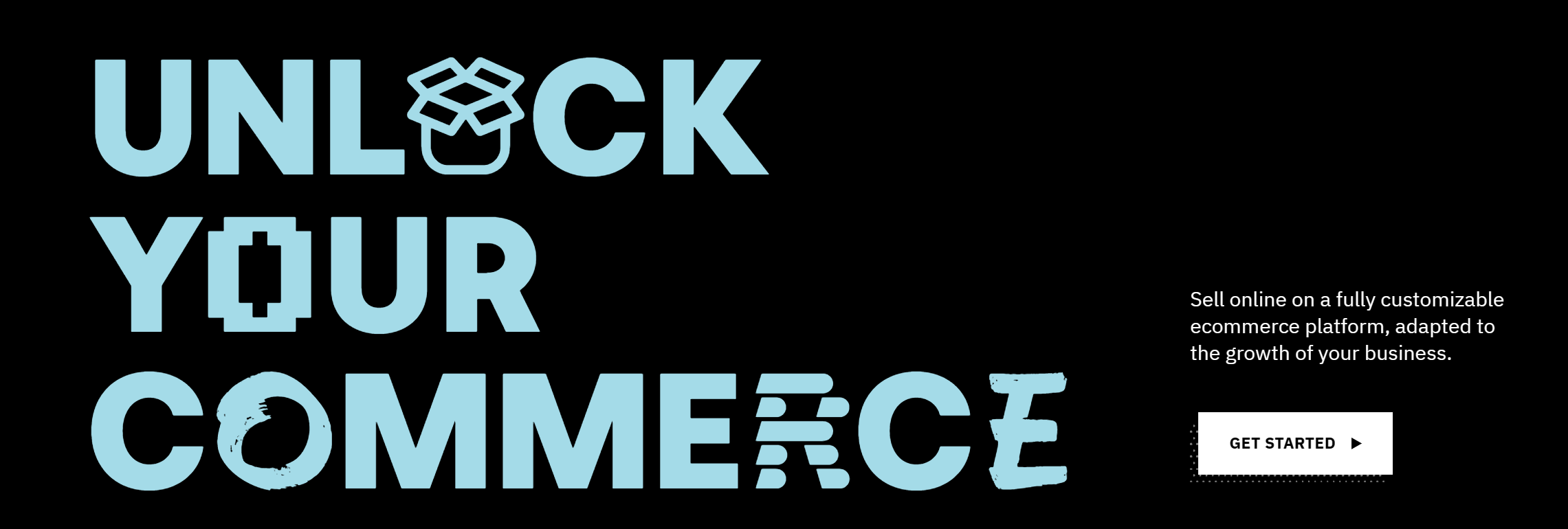
PrestaShop is an open-source platform that enables you to sell as many products as you want without incurring transaction costs. You need to have the technical expertise to use this platform, but it offers you high flexibility and extensive customisation options like integration of payment solutions, adding a shopping cart, cart recovery, updating physical products and more.
It also facilitates easy migration from other platforms like Shopify, Magento and 3dCart. Since it's a free platform, it becomes a strong contender for entrepreneurs and small businesses that want to have complete ownership over their content without using WordPress.
It’s important to note that although it’s a free ecommerce website builder, you still have to buy a custom domain name, and also since it's self-hosted, setup may be challenging. PrestaShop comes with only one pre-installed theme, and you have to subscribe to expensive third-party themes if you wish to have a different look and feel for your online store.
Pros
- 3.3 Trustpilot rating
- Free
- Open-source
- Highly customisable
- Complete ownership of content
- Good availability of themes and modules
- Easy migration from other platforms
Cons
Our verdict
PrestaShop is an open-source ecommerce website builder with great flexibility. If you’re on a budget and have great technical skills, PrestaShop could be the right choice. However, PrestaShop can be expensive and cumbersome if you've limited coding skills or want to set up a complete online system with premium features.
8 - Ecwid: Best online store builder for social media integrations

Ecwid is a simple online store platform that allows you to leverage the power of multi-channel selling, including websites, marketplaces and social media and integrates seamlessly with them. The platform is user-friendly and affordable but isn’t open-source like some others on this list.
Ecwid offers both a free basic plan and advanced plans. In the free basic plan, you can create your store with minimal features and can sell up to 5 products. However, if you want to leverage social media and sell more products, then you need to buy the advanced plan at $82.50.
If you've got an existing WordPress website, then you can use Ecwid to create a widget and add it to your online store to allow customers to make a purchase. The platform provides a variety of customisable templates and designs to create a visually appealing online store.
Pros
- Free forever plan
- Usage of multiple channels
- Built-in tools for Google Analytics and Facebook advertising
- Simple user interface
Cons
- 2.8 Trustpilot rating
- Expensive for large numbers of products
- No support in the free plan
- Need a paid plan for basic features like chat or phone support and social media selling
Our verdict
If you already have an existing website and social media presence and want seamless integration between the two, then Ecwid can be an excellent option. However, you may want to look at other options from our list if you've got a large product portfolio and want extensive functionality and scalability.
Conclusion
As you can see, there are many online store builders to choose from. However, there's no-one-size fits all solution. Some ecommerce website builders sacrifice customizability to give you a beginner-friendly experience, while others may give you high customisation options but won't help you build one.
So if you're an entrepreneur with good technical skills, or a business with a team of developers, you may want to opt for open-source platforms like WooCommerce or PrestaShop.
But for entrepreneurs and small businesses with limited coding skills, Studio Store by Builder.ai is an extremely competitive option to build your online store. This is because you can easily scale your online store with custom features in the future while there are no transaction fees. Plus, the code is yours to keep.
If that sounds good to you, hit the banner below to book a demo 👇
Want to start your app project with us?
Book a demoSpeak with one of our product experts today.
By proceeding you agree to Builder.ai’s privacy policy and terms and conditions

Disclaimer: The content of this article is provided for informational and promotional purposes only and is derived from publicly available data and industry sources. The views and opinions expressed herein represent those of the author alone and do not necessarily reflect the official policy or position of Builder.ai. This content is intended to offer insights and is not a definitive statement on the part of Builder.ai. Readers are advised to consider the promotional nature of the article and to exercise their own judgment in interpreting the author’s perspectives. Builder.ai accepts no liability for any actions taken based on the information provided or for any consequential, special, or similar damages, even if advised of the possibility of such damages.
Stories published by the editorial team at Builder.ai.




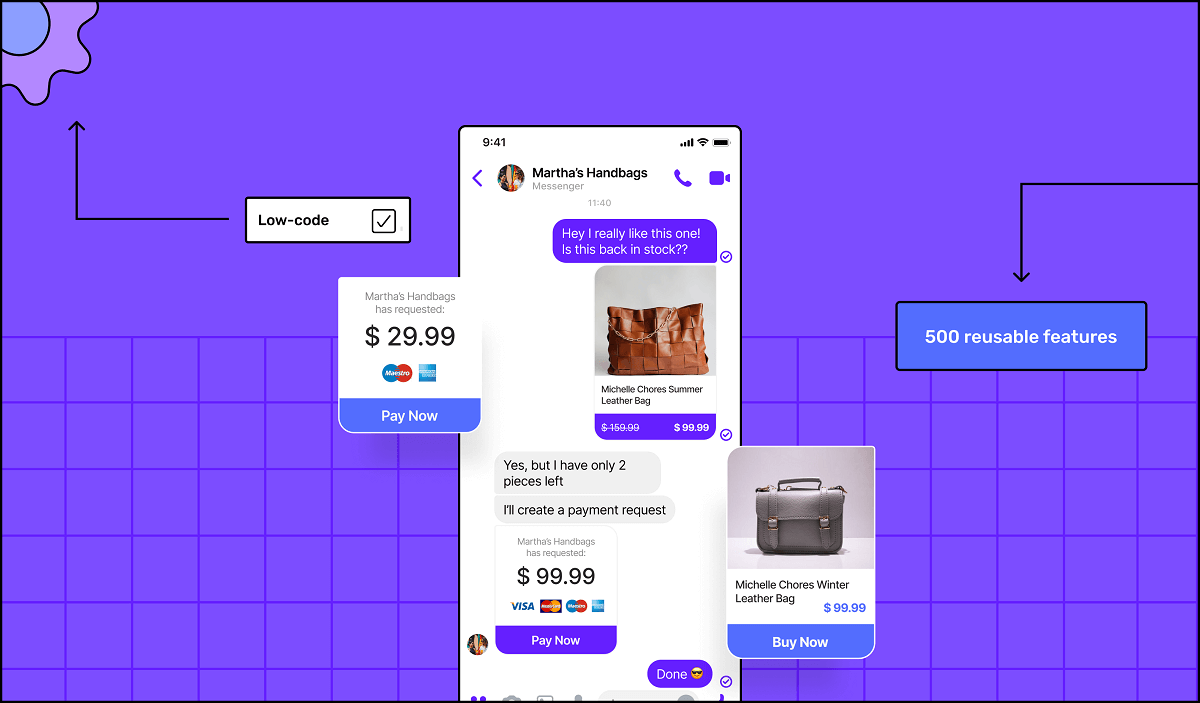







 Facebook
Facebook X
X LinkedIn
LinkedIn YouTube
YouTube Instagram
Instagram RSS
RSS


